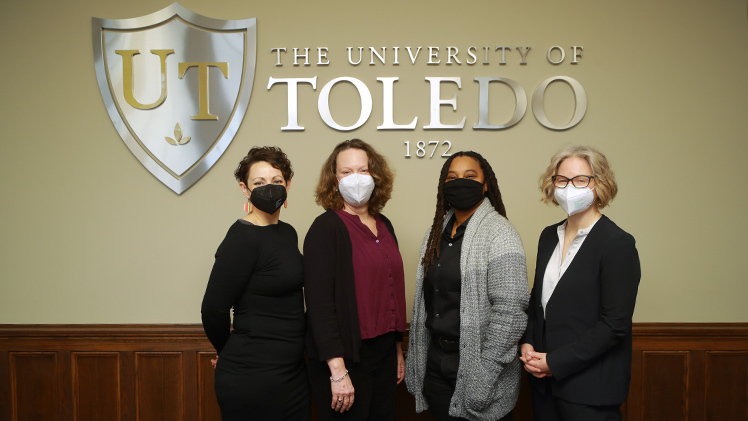A group of faculty in The University of Toledo College of Arts and Letters received a grant from the National Endowment for the Humanities (NEH) to create a health humanities minor aimed at improving healthcare.
The three-year, $133,859 grant will support the development of academic curriculum at UToledo along with paid internships at health organizations and hospitals for liberal arts majors and aspiring physicians and nonclinical administrators.

From left to right, Ally Day, Kim Nielsen, Rachel Dudley and Melissa Gregory in the College of Arts and Letters received a grant from the National Endowment for the Humanities to create a health humanities minor aimed at improving healthcare.
Earning the minor will prepare graduates to better foster curiosity, understanding and respect, and be better equipped to seek new solutions for health disparities and connect with patients.
“In order to improve our ongoing response to COVID-19 as well as our preparedness for future pandemics, we need individuals trained in careful reflection, effective communication, historical context, advanced analysis and an understanding of ethical frameworks — the training provided by a rigorous curriculum in the health humanities,” said Dr. Melissa Gregory, associate dean for undergraduate education and curriculum in the College of Arts and Letters and professor of English. “We need them to be able to change healthcare from the inside out.”
UToledo’s health humanities minor is one of 208 projects across the country to receive a total of $24.7 million in grants announced by the NEH this week.
“These NEH grants will support educators and scholars in enriching our understanding of the past and enable cultural institutions from across the country to expand their offerings, resources and public programming, both in person and online,” said NEH Acting Chair Adam Wolfson. “We look forward to the many new insights and discoveries that these 208 exemplary projects will make possible.”
Starting in February, the first year of the UToledo project will focus on developing curriculum for the 18-credit minor, with the goal of enrolling students starting in fall 2023. Faculty will develop internship partnerships and recruit students during the second year of the grant. The health humanities minor is expected to be implemented in the third year.
“As we have painfully experienced for almost two years during the COVID-19 pandemic, even the wealthiest countries in the world were radically underprepared for a public health challenge of this magnitude,” said Dr. Kim Nielsen, chair and professor of disability studies. “The pandemic both exposed and intensified the failures of our healthcare infrastructure, with minorities, people with disabilities and other socially vulnerable demographics suffering and dying at disproportionately higher rates.”
“It is the moral obligation of the humanities to train our students to think about healthcare systems critically, so that they are better prepared in the future to offer ethically informed, historically aware and socially nuanced responses to public health crises,” said Dr. Ally Day, associate professor of disability studies.
UToledo students who minor in health humanities will be trained to remake models of disease, illness, disability, health and wellness, preparing them to graduate knowing how to use humanities content, questions and methodology to identify problems and seek new solutions.
“Our goal is to provide world-class, health humanities training at The University of Toledo. We want to prepare liberal arts majors to enter both non-clinical and clinical roles in healthcare, health justice and community-wellness work,” said Dr. Rachel Dudley, assistant professor of women’s and gender studies. “Among many other benefits, the health humanities trains future medical and health professionals for personal and inter-cultural reflection. Health humanities approaches provide a multi-disciplinary space to ask a different set of questions about the intersections of culture, health and medical training. This approach will equip our learners for roles that help transform healthcare from the inside out.”
UToledo’s current course catalog in the College of Arts and Letters includes courses in topics such as health history, medical ethics, health narratives and the intersection between health, race, ethnicity, disability and gender that would be included in the new minor program.
The project targets a minimum of five new or newly revised health humanities courses, along with two required foundational courses that are already offered at UToledo: Feminist Health Humanities and Introduction to Disability Studies.
A faculty working group is in the process of forming to work on the student learning outcomes and other curricular elements, including Dr. Nina Atanasova (Philosophy), Dr. Joey Kim (English), Dr. Kristen Geaman (History) and Dr. Roberto Padilla (History).
The NEH, an independent federal agency created in 1965, supports research and learning in history, literature, philosophy and other areas of the humanities by funding selected, peer-reviewed proposals from around the nation.
Read the NEH grant announcement on its website.